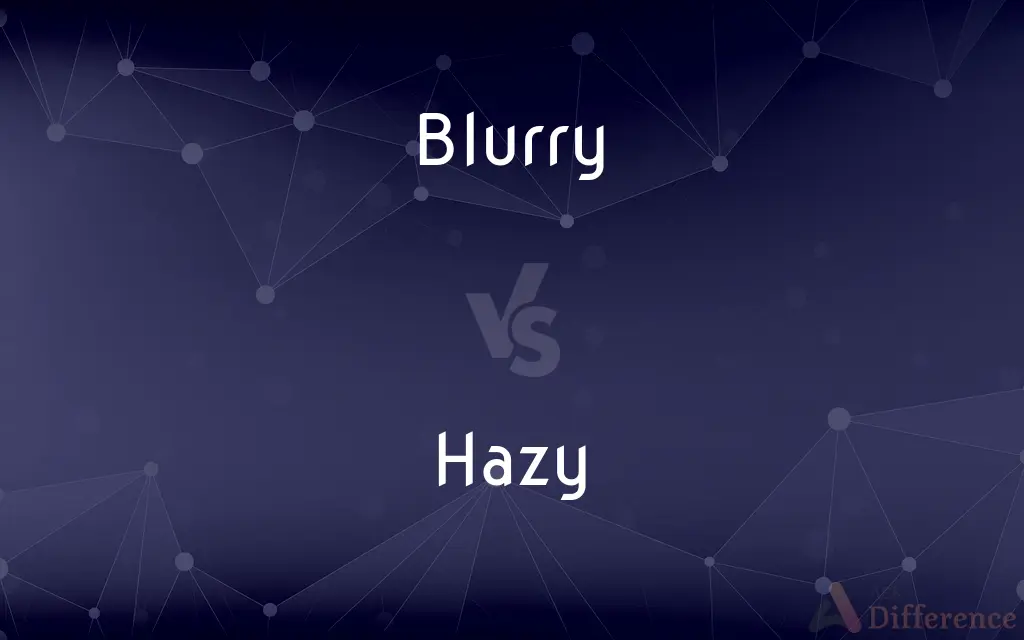Blurry vs. Hazy — What's the Difference?
By Maham Liaqat & Fiza Rafique — Updated on March 30, 2024
Blurry describes a lack of sharpness or detail in an image or view, often due to focus issues, while hazy refers to a reduction in visibility or clarity caused by atmospheric conditions like dust, smoke, or mist.

Difference Between Blurry and Hazy
Table of Contents
ADVERTISEMENT
Key Differences
Blurry and hazy are terms often used to describe visual perception, but they originate from different causes and imply distinct visual effects. A blurry image or scene lacks sharpness and detail, making objects appear indistinct due to issues with the focus or movement. Hazy conditions, however, are caused by atmospheric particles such as dust, smoke, or mist, which scatter light and reduce the clarity and color saturation of the view, giving it a whitish or grey overlay.
The term "blurry" is commonly used in photography and optics to describe an image that fails to capture the crispness and detail of its subject, whether because the camera is out of focus, the subject is moving, or there are imperfections in the lens. On the other hand, "hazy" is more frequently associated with weather conditions or air quality, affecting not just the clarity of specific objects but the overall visibility across a landscape or scene.
In everyday language, blurry is often applied to describe a temporary state of vision, such as what one might experience when not wearing corrective glasses or upon waking. Hazy, conversely, is used to describe the state of the atmosphere or air, often related to pollution, wildfire smoke, or natural fog, which can impact outdoor visibility and even air quality.
While the concept of blur can be controlled or corrected in photography through technological means like adjusting the focus, changing the lens, or using image stabilization features, haze is an environmental condition that can be challenging to mitigate without changes in weather or air quality. Photographers might use filters or post-processing techniques to reduce the appearance of haze in images, highlighting the distinction in how each condition is addressed.
Despite their differences, both terms can metaphorically describe a state of confusion or lack of clarity in thoughts, emotions, or communications, showcasing their versatility in language beyond their literal visual implications.
ADVERTISEMENT
Comparison Chart
Definition
Lack of sharpness or detail in an image or view
Reduction in visibility caused by atmospheric conditions
Cause
Focus issues, movement, lens imperfections
Atmospheric particles like dust, smoke, mist
Common Usage
Photography, optics, temporary vision issues
Weather conditions, air quality
Correction
Adjusting focus, using image stabilization
Filters, post-processing in photography; environmental changes for natural reduction
Metaphorical Use
Describes confusion or lack of clarity in thoughts or communications
Often used to describe general states of uncertainty or diffuse problems
Compare with Definitions
Blurry
Can be corrected through technological means.
Image stabilization technology helps prevent blurry pictures.
Hazy
Reduced visibility due to atmospheric conditions.
The skyline was hazy due to the summer wildfires.
Blurry
An image or scene lacking sharpness and detail.
The photo was blurry because the camera wasn't focused properly.
Hazy
Can be somewhat mitigated in photography.
Using a polarizing filter can reduce the appearance of haze in landscape photos.
Blurry
Often results from movement or focus issues.
Her vision was blurry until she put on her glasses.
Hazy
Caused by particles like dust, smoke, or mist.
A hazy morning mist enveloped the valley.
Blurry
Metaphorically implies a lack of clarity.
His thoughts were blurry after receiving the shocking news.
Hazy
Affects overall atmospheric clarity.
The city has been under a haze alert due to pollution levels.
Blurry
Associated with optics and photography.
A blurry lens can ruin a potentially great shot.
Hazy
Symbolizes uncertainty or diffuseness.
Her explanation was as hazy as the smoke-filled sky.
Blurry
"Blurry" is a song by the American rock band Puddle of Mudd. It was released on October 16, 2001, as the second single from the band's debut album, Come Clean (2001).
Hazy
Marked by the presence of haze; misty
Hazy sunshine.
Blurry
To make indistinct and hazy in outline or appearance; obscure
The haze blurred the skyline.
Hazy
Unclear, confused, or uncertain
I have only a hazy notion of what she wants. I'm a bit hazy on the new budget.
Blurry
To make dim, unclear, or cloudy
The smoke blurred my vision.
Hazy
Thick or obscured with haze.
A hazy view of the polluted city street
Blurry
To cause to be intellectually indistinguishable
New thinking has blurred the divisions between disciplines.
Hazy
Not clear or transparent.
Blurry
To become visually indistinct
The faces blurred in the crowd.
Hazy
Obscure; confused; not clear.
A hazy argument
A hazy intellect
Blurry
To be unclear or clouded
His vision blurred as the drug took effect.
Hazy
Thick with haze; somewhat obscured with haze; not clear or transparent.
Blurry
To become intellectually indistinguishable
TV commercials and shows seem to blur into one another.
Hazy
Obscure; confused; not clear; as, a hazy argument; a hazy intellect.
Blurry
Something that is hazy and indistinct to the sight or mind.
Hazy
Filled or abounding with fog or mist;
A brumous October morning
Blurry
(of an image) Not clear, crisp, or focused; having fuzzy edges.
If I take off my glasses, everything close up looks blurry.
Hazy
Indistinct or hazy in outline;
A landscape of blurred outlines
The trees were just blurry shapes
Blurry
Full of blurs; blurred.
Blurry
Indistinct or hazy in outline;
A landscape of blurred outlines
The trees were just blurry shapes
Common Curiosities
What causes an image to be blurry?
Blurriness in images is often caused by focus issues, movement during exposure, or imperfections in the lens.
Is blurriness always undesirable in photography?
Not always; artistic blur, like bokeh or motion blur, can be used creatively to convey movement or depth.
What's the difference between fog and haze?
Fog is a type of low-lying cloud that makes the air moist, while haze is dry and caused by particles scattering light.
How does haze affect visibility?
Haze scatters light, reducing visibility and clarity, and can give the air a whitish or grey appearance.
Can you fix blurry photos?
While some blur can be corrected through software, the best solution is prevention using proper focus and stabilization techniques.
Are there health risks associated with hazy conditions?
Hazy conditions, especially those due to pollution or smoke, can pose respiratory health risks.
Can a hazy day affect air quality?
Yes, haze from pollution or smoke can significantly deteriorate air quality, impacting health.
What measures can reduce haze pollution?
Reducing emissions from vehicles and industries, along with managing wildfires, can help mitigate haze pollution.
What contributes to a hazy atmosphere?
Smoke from wildfires, dust storms, and pollution can all contribute to hazy conditions.
Is it possible to predict when conditions will be hazy?
Weather forecasts and air quality alerts can often predict hazy conditions, especially related to pollution or seasonal wildfires.
Does wearing glasses help with blurry vision?
Yes, corrective glasses are designed to adjust the focus of your vision, reducing blurriness for those with refractive errors.
How can haze be reduced in photos?
Using a polarizing filter or applying post-processing techniques can help reduce the appearance of haze.
Why might an area experience hazy days?
Weather patterns, pollution levels, and natural disasters like wildfires can all lead to hazy conditions.
Can blurriness affect one's depth perception?
Yes, blurriness can impact depth perception, making it difficult to judge distances accurately.
How can one protect their vision in hazy conditions?
Wearing protective eyewear and limiting exposure to outdoor air during severe haze can help protect your eyes.
Share Your Discovery

Previous Comparison
Sord vs. Sword
Next Comparison
Layer vs. SphereAuthor Spotlight
Written by
Maham LiaqatCo-written by
Fiza RafiqueFiza Rafique is a skilled content writer at AskDifference.com, where she meticulously refines and enhances written pieces. Drawing from her vast editorial expertise, Fiza ensures clarity, accuracy, and precision in every article. Passionate about language, she continually seeks to elevate the quality of content for readers worldwide.














































